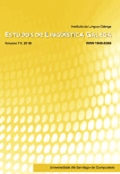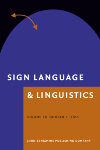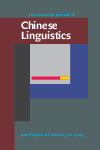
Jezikoslovlje
Scope & Guideline
Championing Scholarly Excellence in Linguistics
Introduction
Aims and Scopes
- Linguistic Analysis of Syntax and Semantics:
The journal frequently publishes studies focusing on the syntactic and semantic properties of language structures, particularly in Slavic languages. This includes research on clauses, coordination, and the interplay between syntax and semantics. - Cognitive Linguistics:
A notable focus is placed on cognitive approaches to language, exploring how cognitive processes influence linguistic structures and meaning. This includes analyses of metaphor, metonymy, and the cognitive underpinnings of grammar. - Language and Ideology:
Research often delves into the relationship between language and ideology, examining how linguistic choices reflect and shape social and political contexts, particularly in the context of Croatian and other Slavic languages. - Pedagogical Approaches in Language Learning:
The journal includes studies on language pedagogy, exploring effective methods for teaching languages like German and English, as well as the integration of proverbs and cultural elements in language education. - Diachronic and Historical Linguistics:
There is a consistent interest in historical aspects of Slavic languages, including studies on the evolution of language forms and the historical context of linguistic changes. - Dialectology and Regional Variations:
The journal also addresses regional dialects and variations within Croatian and other Slavic languages, contributing to the understanding of linguistic diversity.
Trending and Emerging
- Interdisciplinary Approaches to Language Studies:
There is a growing trend towards interdisciplinary research that integrates insights from cognitive science, sociology, and cultural studies into linguistic analysis, providing a richer understanding of language in context. - Digital Linguistics and New Media:
Recent publications increasingly address the impact of digital communication and media on language use, including studies on online discourse, social media language, and the evolution of language in digital contexts. - Language Learning in Multilingual Contexts:
Emerging themes include the exploration of language learning strategies in multilingual environments, emphasizing the complexities faced by learners in diverse linguistic contexts. - Pragmatics and Discourse Analysis:
There is an upward trend in research focusing on pragmatics and discourse, with studies examining language use in social interactions, politeness strategies, and the pragmatics of complimenting in various cultural contexts. - Connection Between Language and Identity:
Research exploring the interplay between language and identity, particularly in multicultural and multilingual settings, has gained traction, reflecting broader societal discussions about language and personal or group identity.
Declining or Waning
- Traditional Grammatical Studies:
There has been a noticeable decrease in the publication of traditional grammar-focused studies. The journal's recent issues feature fewer articles solely dedicated to prescriptive grammar, indicating a shift towards more dynamic and descriptive approaches to language. - Comparative Linguistics:
Although comparative studies of Slavic languages were once prevalent, recent publications reflect a declining interest in purely comparative analyses. Instead, there is a growing focus on more specific linguistic phenomena within individual languages. - Historical Text Analysis:
Research analyzing historical texts and their linguistic features is less common in recent volumes, suggesting a waning interest in this area. The journal appears to be moving towards contemporary linguistic phenomena rather than historical linguistics.
Similar Journals

Estudos de Linguistica Galega
Exploring the Richness of Galician LinguisticsEstudos de Linguistica Galega, an esteemed journal published by the University of Santiago de Compostela, provides a critical platform for scholars engaged in the vibrant field of linguistics, particularly focusing on the Galician language and its surrounding linguistic phenomena. Launched in 2009, this Open Access journal enables unrestricted dissemination of research, facilitating engagement from a global audience. With an impact factor that positions it within the Q4 quartile in Linguistics and Language, it reveals a strong commitment to advancing the discourse in this niche. It ranks #691 out of 1088 in the Arts and Humanities category, underscoring its relevance in the academic landscape. The journal aims to foster collaboration and innovation among researchers and practitioners, making significant contributions to understanding linguistic diversity and its implications in contemporary society. Located in Santiago de Compostela, Spain, the journal encourages submissions that explore theoretical, empirical, and applied linguistic studies, thereby inviting researchers, professionals, and students to contribute to this growing field.

Voprosy Yazykoznaniya
Exploring the Depths of Linguistic InsightVoprosy Yazykoznaniya, published by the esteemed Russian Academy of Sciences and the State Academy of Humanities (GAUGN), stands as a leading journal in the field of linguistics and language studies. With an impressive Q2 rank in Linguistics and Language for 2023 and a strong position within Scopus rankings, this journal fosters scholarly dialogue and pushes the boundaries of linguistic research by providing a platform for innovative studies, reviews, and analyses. Although not open access, its publication ensures high academic standards and visibility within the global academic community. Researchers, professionals, and students alike can benefit from the rich insights and diverse perspectives presented in this journal, serving as a vital resource for anyone interested in the intricacies of language and its role in society. Operating since 2009 and continuing to 2024, Voprosy Yazykoznaniya is an essential reference point for contemporary linguistic scholarship in the Russian Federation and beyond.

Lingua Italiana
Advancing Scholarship in Italian Linguistics and LiteratureLingua Italiana is a distinguished journal published by FABRIZIO SERRA EDITORE, dedicated to the exploration and advancement of the Italian language in both its literary and linguistic contexts. With its ISSN 1724-9074 and E-ISSN 1826-8080, Lingua Italiana aims to foster scholarly dialogue among researchers, professionals, and students invested in Italian studies, linguistics, and cultural discourse. Located in Pisa, Italy, the journal provides a platform for rigorous peer-reviewed articles that reflect the latest research, theoretical frameworks, and critical analyses. Although it operates under a subscription model, the journal remains an invaluable resource due to its commitment to quality content and comprehensive coverage of contemporary issues affecting the Italian language. By contributing to Lingua Italiana, authors can not only enhance their academic footprint but also engage with a global audience interested in rich linguistic heritage and its evolution.

Estudios de Linguistica-Universidad de Alicante-ELUA
Championing Accessibility in Cutting-edge Linguistic StudiesEstudios de Linguistica-Universidad de Alicante-ELUA is a distinguished academic journal dedicated to advancing the field of linguistics, published by Universidad de Alicante. With an Open Access model adopted since 2020, ELUA facilitates greater accessibility to pioneering research for scholars and enthusiasts alike. The journal's ISSN is 0212-7636 and its E-ISSN is 2171-6692, ensuring it is indexed and easily discoverable in academic databases. Though the journal's H-Index is currently not specified, its commitment to disseminating high-quality linguistics research positions it as a valuable resource for researchers, professionals, and students. The journal aims to foster scholarly dialogue and innovation in various linguistic domains, making it an essential platform for sharing insights and findings that shape contemporary linguistic studies. Based in Alicante, Spain, ELUA is poised to contribute significantly to the global linguistics landscape.

LINGUISTIQUE
Connecting Theory with Practice in LinguisticsLINGUISTIQUE, an esteemed journal published by PRESSES UNIV FRANCE, serves as a vital platform for scholarly discourse in the fields of linguistics and language studies. With its ISSN 0075-966X and E-ISSN 2101-0234, this French journal has been a significant contributor to the understanding of linguistic phenomena since its inception in 2004, and it continues its journey through to 2024. Although currently categorized in the Q4 quartile for both Arts and Humanities (miscellaneous) and Linguistics and Language, its commitment to publishing quality research encourages a diverse range of articles, reviews, and innovative studies. Positioned in the 32nd and 29th percentiles for its respective fields according to Scopus rankings, LINGUISTIQUE is dedicated to advancing knowledge and stimulating engagement among researchers, professionals, and students alike. While it does not offer open access, the journal remains an essential resource for those who seek to deepen their understanding of linguistic principles in a global context, facilitating a richer discourse that connects theory with practice.

Functions of Language
Fostering Scholarly Dialogue in Linguistic FunctionsFunctions of Language, published by John Benjamins Publishing Co, serves as a vital platform for scholars and practitioners in the fields of linguistics and language studies. With its ISSN 0929-998X and E-ISSN 1569-9765, this esteemed journal, based in the Netherlands, has solidified its reputation through a focused dedication to exploring the multifaceted roles that language plays across various contexts. Ranked in the top percentile of leading journals in Linguistics and Language (Q2 category, 2023) and holding impressive Scopus ranks within both the Arts and Humanities and Social Sciences sectors, the journal emphasizes research that interlinks theoretical insights with practical implications. Functions of Language aims to advance our understanding of linguistic structures and their applications, making it an essential resource for researchers, professionals, and students alike who are eager to contribute to the evolving discourse in language studies. With content converging from 1994 to 2024, the journal reflects ongoing scholarly engagement and innovation in the field.

Studia z Filologii Polskiej i Slowianskiej
Exploring the Depths of Slavic LinguisticsStudia z Filologii Polskiej i Slowianskiej is a prominent journal published by the Polish Academy of Sciences, Institute of Slavic Studies, focusing on the rich and diverse field of linguistics and language studies, particularly within the Slavic context. With the ISSN 0081-7090 and E-ISSN 2392-2435, this open-access journal has been a valuable resource for researchers, professionals, and students since its transition to an open-access model in 2014. It features rigorous peer-reviewed articles that contribute to the understanding of linguistic phenomena and cultural narratives across Slavic languages. Recognized within the Q3 quartile of linguistics and language in 2023, it ranks at the intersection of arts, humanities, and social sciences, providing insights that echo through disciplines such as sociolinguistics, psycholinguistics, and philology. In its ongoing publication trajectory from 2011 to 2023, Studia z Filologii Polskiej i Slowianskiej continues to foster academic discourse and collaboration, positioning itself as a key player in the global linguistic community.

Sign Language & Linguistics
Unveiling the Linguistic Richness of Sign LanguagesSign Language & Linguistics is an esteemed academic journal published by John Benjamins Publishing Co, dedicated to advancing the field of sign language studies and linguistics. With an ISSN of 1387-9316 and an E-ISSN of 1569-996X, this journal has earned a prominent place in the linguistic community, achieving a Q1 ranking in both the Linguistics and Language category, and standing out within the Scopus rankings, placing in the 77th percentile among the Arts and Humanities and 75th percentile in the Social Sciences categories. Sign Language & Linguistics spans over two decades of research, offering comprehensive insights and analyses from 1998 to 2024, promoting high-quality scholarly communication. Aimed at researchers, professionals, and students alike, this journal is essential for those exploring the intersection of sign languages, linguistics, and cultural studies, facilitating progressive discourse and fostering an understanding of this vital mode of human communication.

International Journal of Chinese Linguistics
Elevating Chinese Linguistics to Global StandardsInternational Journal of Chinese Linguistics is a distinguished publication that delves into various aspects of linguistic studies pertaining to the Chinese language. Published by John Benjamins Publishing Co, this journal stands out for its commitment to advancing the knowledge and understanding of Chinese linguistics within the global academic community. With an impact factor that places it in the Q2 quartile of linguistics and language, the journal is indexed in prominent databases, achieving ranks of #501 in Arts and Humanities and #580 in Social Sciences. These rankings reflect the journal's dedication to maintaining high scholarly standards and its relevance in both linguistic research and practical applications. While not categorized as Open Access, the journal provides necessary access through institutional subscriptions, thereby ensuring that valuable research reaches a broad audience. Covering a wide range of topics from syntax and phonetics to sociolinguistics and applied linguistics, the International Journal of Chinese Linguistics serves as an essential resource for researchers, professionals, and students seeking to deepen their understanding of the intricate relationship between language and culture in the Chinese context. With converging years from 2019 to 2024, it continues to evolve, reflecting ongoing developments in the field.

Suvremena Lingvistika
Fostering Innovation in Linguistics and Language Studies.Suvremena Lingvistika is a distinguished open-access journal published by the Croatian Philological Society, dedicated to advancing research in the field of linguistics and language. Since its establishment, the journal has been pivotal in promoting scholarly dialogue within the linguistics community, especially among researchers and academics in Croatia and beyond. With an ISSN of 0586-0296 and an E-ISSN of 1847-117X, the journal has transitioned to an open-access model since 2007, ensuring that research is freely accessible to all. As of 2023, it holds a respectable Q3 ranking in the Linguistics and Language category, reflecting its potential contribution to the field. The journal's scope encompasses a wide array of linguistic disciplines, encouraging both theoretical and empirical studies. Supportive of new research, Suvremena Lingvistika aims to foster innovative approaches and methodologies in linguistics, making it an essential resource for students, researchers, and professionals eager to explore the complexities of language. With its ongoing publication until 2024, it continues to shape the linguistic landscape, providing valuable insights and fostering collaboration among scholars globally.